
Photo Source: Wikimedia Commons
“There have been more than 350 “mass shootings” in the United States this year (in which four or more people were killed or injured by gunfire), or more than one per day, a crowdsourced collection of news reports. The rate of U.S. gun deaths, while down in recent years, still remains significantly higher than any other wealthy nation in the world (as do gun ownership rates). A mass shooting in early December, in which 14 people were killed at a social service center in San Bernardino, CA, has reignited a fierce national debate over how to most effectively curb gun violence.
In early January, President Obama announced a series of executive actions to tighten gun control background checks and improve gun safety technology and research. But the Republican presidential candidates and party leaders were quick to attack the move as a direct threat to 2nd Amendment rights.
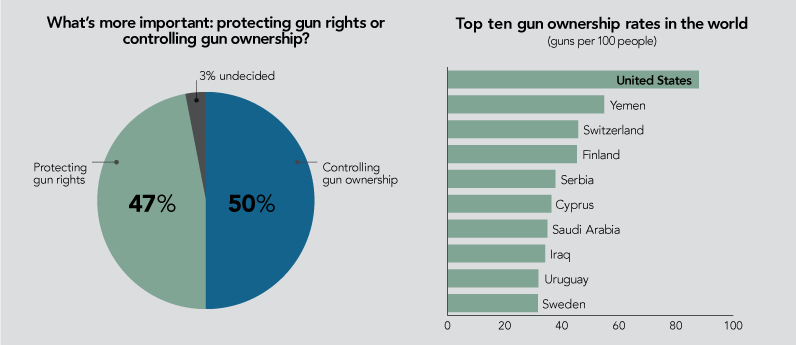
Sources: Pew Research Center (survey conducted July, 2015) and UNODC & Small Arms Survey (via the Guardian, 2007)
The candidates are all avid defenders of 2nd amendment rights, and most are strongly opposed to any efforts to enact additional gun control regulations. Many also firmly support local “Stand Your Ground” laws. George Pataki is the only candidate that advocates for some additional restrictions, including a ban on some assault weapons.
All three candidates are pushing for “common sense” reforms, which include a ban on assault weapons and stricter background screening procedures for gun purchasing. Interestingly, Sanders, the most left-leaning of the Democratic pack, is the softest on federal gun policy. Unlike Clinton and O’Malley, he’s opposed to federal handgun waiting periods and has advocated for certain protections for gun manufacturers. As a congressman, he voted against the 1993 Brady Bill, a major piece of gun control legislation.
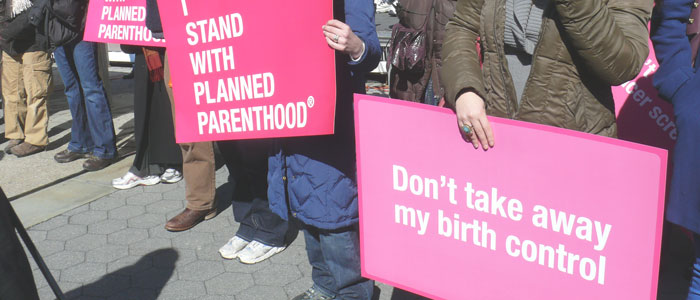
Photo Credit: Flickr/Charlotte Cooper
Abortion has again become as a major flashpoint on the campaign trail, particularly in the wake of recent battles over federal funding of Planned Parenthood.
Although over 40 years have passed since the Supreme Court's landmark Roe v. Wade decision legalizing abortion nationwide, Americans still remain deeply divided on the issue. Over half the country believes that abortion should be legal in all or most cases, while 40 percent think it should be outlawed, according to a Pew Research poll.
Opinions about abortion remain largely guided by religious beliefs. Abortion views also vary widely by region, with conservative states in the South and Midwest pushing to enact laws restricting access to facilities and services, while more liberal coastal states, like California and New York, have maintained stronger protections.
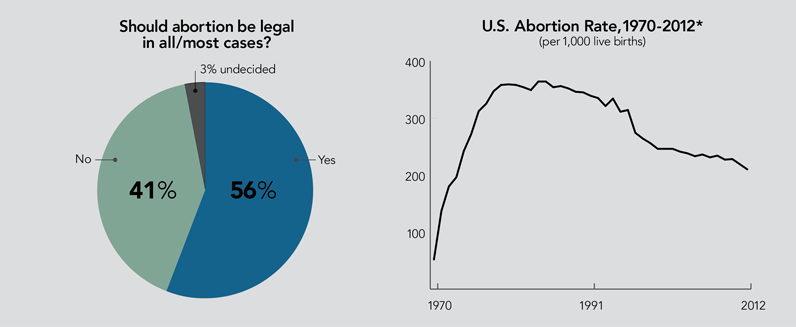
Sources: Pew Research Center (survey conducted Sept, 2014) and Centers for Disease Control and Prevention (CDC), Abortion Surveillance Reports. *Based on legally induced abortions reported to the CDC.
Every Republican candidate has taken a pro-life stance and advocated, to varying degrees, for restrictions on abortion procedures. Mike Huckabee, Ben Carson, Marco Rubio and Ted Cruz are among the candidates pushing to outlaw the procedure, even in cases of rape and incest. George Pataki, while anti-abortion, is the only candidate in the pack who openly supports upholding Roe v. Wade. However, every candidate supports defunding Planned Parenthood and allowing businesses to opt out of providing health care services that include contraception and abortion.
Every Democratic candidate is pro-choice and all three have voiced their staunch support for a woman’s’ right to choose. They also all support continued federal funding of Planned Parenthood programs and increased access to abortion facilities.
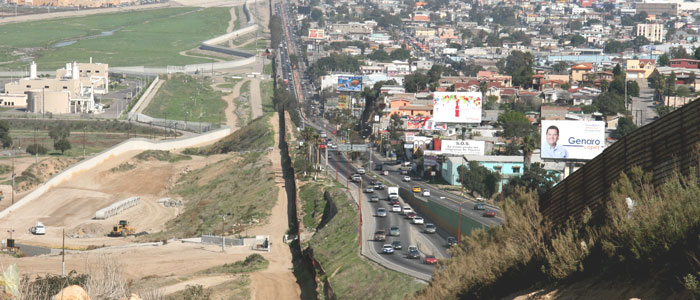
Photo Source: Wikimedia Commons
Immigration policy is one of the most deeply divisive issues in the campaign. The United States is still a top destination for immigrants, attracting roughly 20 percent of the world’s immigrant population. More than 41 million immigrants reside in the U.S., comprising about 13 percent of the nation’s total population. Of those, roughly 11.3 million are unauthorized immigrants, living here without legal status.
Although most Americans believe it's unrealistic to deport every unauthorized immigrant, many support tighter immigration restrictions, including the completion of a U.S.-Mexican border wall. However, more than three-quarters of Americans say unauthorized immigrants should be eligible for citizenship if they meet certain requirements, and only 17 percent say they would support mass deportation, according to a 2014 Pew Research report.
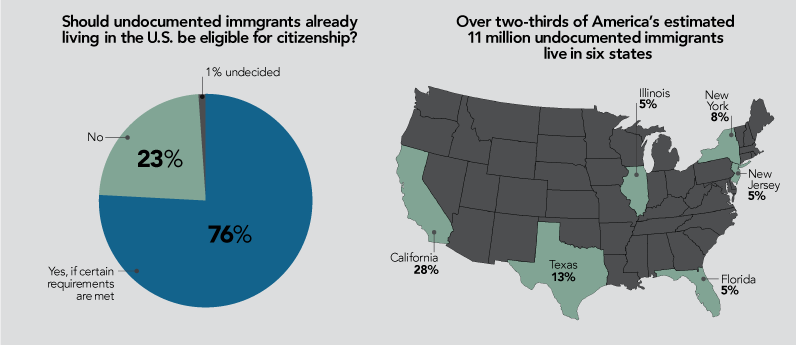
Sources: Pew Research Center (2014 Political Polarization in the American Public) and Migration Policy Institute (based on 1970-2000 decennial Census data)
Donald Trump, Ted Cruz and several other Republican candidates advocate for extremely stringent levels of enforcement, vying to remove all undocumented residents, build a border wall and repeal the constitutional guarantee of birthright citizenship. However, other Republicans, like Jeb Bush and John Kasich, are more politically moderate on the issue, favoring some stricter enforcement rules while also proposing certain paths to legal status for some unauthorized immigrants already living here.
Republicans are united against President Obama's pledge to accept 10,000 Syrian refugees in 2016. Donald Trump and Chis Christie are the leading critics of the plan, while others advocate for the implementation of a much stricter screening process. Jeb Bush and Ted Cruz have proposed focusing on accepting only "Christian refugees" and others
The three Democratic candidates oppose mass deportations and uniformly support a path to citizenship for unauthorized immigrants. However, Bernie Sanders is the only one who openly opposes building a border wall: as a senator, he voted against the 2006 Secure Fence Act (HR 6061).
The Democratic candidates all support Obama’s pledge to accept Syrian refugees. Martin O'Malley and Hillary Clinton have both proposed upping the ante and accepting up to 65,000 refugees from Syria.
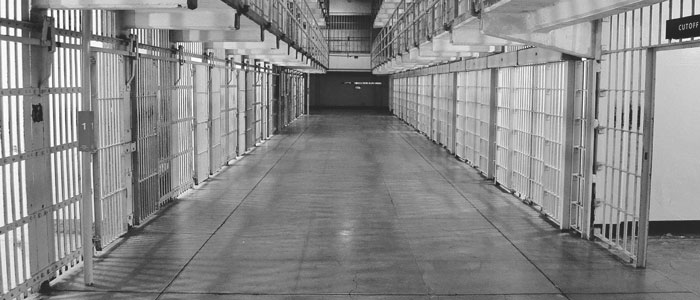
Photo Source: Wikimedia Commons
Decades of harsh criminal sentencing polities and steep penalties for non-violent drug offenses have led in a huge spike in the U.S. prison population, which remains by far the largest in the world. Given the lack of efficiency of the system, its astronomical cost and its stark racial disparities, prison reform is actually one of the few issues that Republicans and Democratic candidates have some common ground on.
There’s general consensus among most candidates that America’s system of mass incarceration is in need of reform, and that prison sentences for low-level, non-violent offenders should, in most cases, be reduced. Additionally, in the wake of recent high profile police shootings and the rise of the Black Lives Matter movement, candidates on both sides are confronting national issues on policing and race.
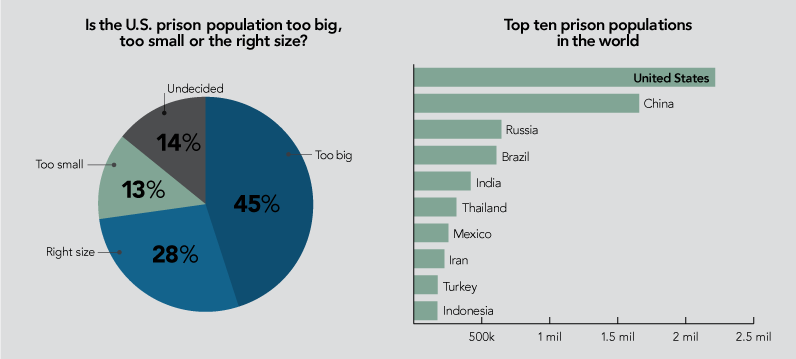
Sources: Prison Policy Initiative: "Public Opinion on Sentencing & Corrections Policy in America" (March 2012) and World Prison Brief - Intitute for Criminal Policy Research (2013)
While acknowledging the importance of the issue, most candidates haven’t yet taken any official stances on criminal justice. Some have called for more lenient sentencing for drug offenders, while Ted Cruz and Marco Rubio have more specifically proposed simplifying the federal criminal code.
Rand Paul is the most outspoken Republican on the issue, and as a senator, was involved in bipartisan criminal justice reform efforts. Paul is also the only Republican candidate in favor of decriminalizing marijuana, citing the disproportionate effect the war on drugs has had on low-income and minority communities.
All three candidates talk of ending mass incarceration. Hillary Clinton and Bernie Sanders have both formally met with Black Lives Matter leaders and both support reduced sentencing for drug offenders. Sanders, however, stands alone in his call for fully decriminalizing marijuana.
Sanders and O'Malley are the only candidates from either party who oppose the death penalty.

Photo Source: Wikimedia Commons
The economy is officially rebounding from the depths of the 2008-9 recession and employment rates continue to rise. However, wages remain stagnant for large numbers of Americans, and the nation is faced with a shrinking middle class and a widening gap between rich and poor. Wealth inequality in the U.S. is now at near record highs, with about 90 percent of wealth owned by the top .1 percent of families, according to recent economic research.
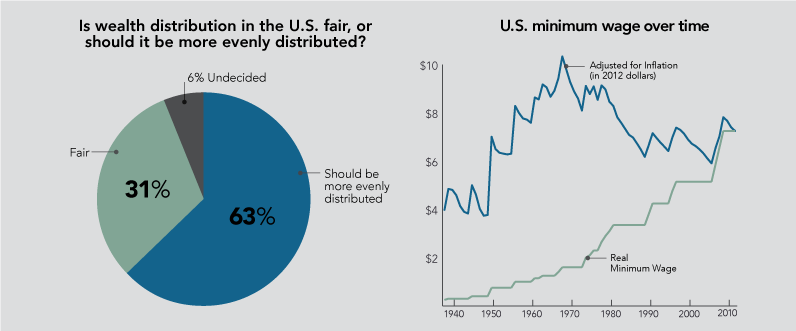
Sources: Gallup Poll Series (survey conducted April, 2015) and United States Department of Labor(2012)
The 2016 Republican field are almost uniformly opposed to raising the federal minimum wage, which has remained at $7.25/hour since 2009. Candidates argue that doing so would have a negative economic impact, forcing more jobs overseas. Interestingly, Donald Trump is the only Republican candidate who leans more to the left on tax reform, recently calling to raise taxes for the super-rich and
ending loopholes for hedge-funds.
The candidates have kept fairly quiet on specific plans for job creation, although most are generally in favor of private incentives (like corporate tax cuts) as a way to keep businesses in the U.S. Almost all are opposed to tax increases and increased government financial regulation and oversight.
The Democratic candidates all support raising the federal minimum wage. Bernie Sanders and Martin O'Malley both propose more than doubling it, to $15/hr, by 2020. Hillary Clinton supports increasing it to $12, and encouraging regions that “can afford it” to raise it higher than that.
The Democrats also all believe the wealthy need to pay more in taxes to boost government spending on social programs. All three support ending tax-credits for the wealthy, and stopping large concessions and loopholes for Wall Street banking firms.
Sanders champions the most sweeping plan to reduce income inequality, vowing to raise taxes for the highest earners and corporations, break up the largest banks and allocate $1 trillion for infrastructure projects to create jobs for the middle class. Clinton has taken a less direct stance, proposing a modest increase in the capital gains tax and calling to close “loopholes and expenditures for the most fortunate.”

Photo Source: Wikimedia Commons
The global threat of terrorism has reemerged as key issue in this campaign, particularly in the wake of the Syrian conflict, the rise of the Islamic State (ISIS) and the recent attacks in Paris. Although a majority of Americans consider the rise of ISIS a top threat to American interests, 57% of the public oppose sending U.S. ground troops back into Iraq, according to a recent Brookings Institute survey.
Discussion of the Iran Nuclear Deal, an international agreement to curb the country's enrichment programs, is also a point of contention on the campaign trail. The latest Pew Research poll found that a majority of Americans disapproved of the deal.
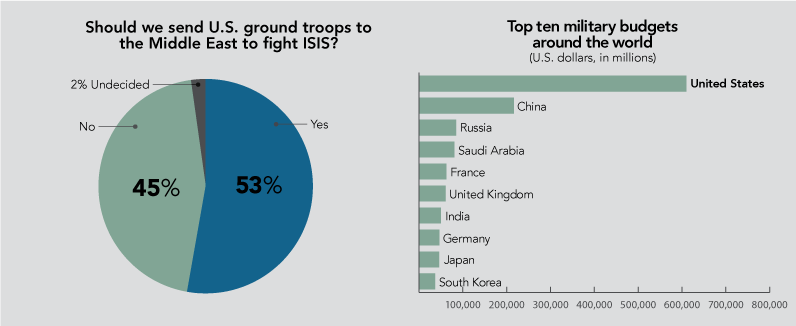
Sources: CNN/ORC poll (December, 2015) and Stockholm International Peace Research Institute
Republicans are generally more in favor of using military force, including an aggressive response to ISIS. The notable exception among Republicans is Rand Paul, who advocates for a largely non-interventionist military strategy.
All candidates on the right oppose President Obama's nuclear deal, which they insist is a disaster for the United States that grants too many concessions to known enemies and weakens our relationship with Middle Eastern allies.
Hillary Clinton, who served as Secretary of State during President Obama’s first term, is the most hawkish of the Democratic candidates, advocating for greater U.S. involvement overseas. She argues that we should have acted more proactively and aggressively to stop the rise of ISIS in Syria. Bernie Sanders and Martin O'Malley have taken a more isolationist stance on Middle East policy; unlike Clinton, both oppose a no-fly zone over Syria. Sanders has repeatedly voiced hesitation about getting sucked into another quagmire in the region.
All three Democratic candidates support – to varying degrees – President Obama's Nuclear Deal with Iran.

Photo Source: Wikimedia Commons
After decades of failed climate policy efforts, President Obama is attempting to make the U.S. a global leader in curbing carbon emissions. The nation remains one of the largest per capita carbon emitter, in the world (although China is now the largest total emitter). In December, Obama pushed his “Clean Power Plan,” at the United Nations climate change conference in Paris, pledging a 32 percent reduction in carbon emissions (from 2005 levels) by 2030 – a proposal that’s already faced staunch opposition from Republicans.
Although the share of renewable energy sources is growing, America is still deeply reliant on fossil fuels: coal, natural gas and oil still comprise about two-thirds of our total energy generation. Proposals to increase alternative energy production and reduce emissions are commonly perceived as a threat to the economy and jobs, particularly in regions where fossil fuel production remains the backbone of the local economy.
Despite such concerns, a strong majority of Americans (71 percent) say that the country should do whatever it takes to protect the environment.
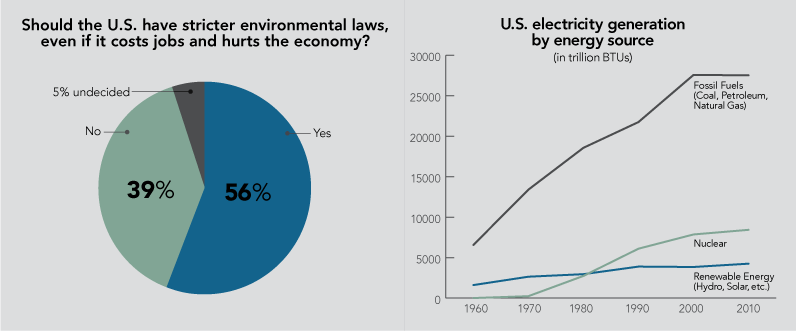
Sources: Pew Research Report (January, 2015) and U.S. Energy Information Administration (2014)
About half the Republican candidates dispute the existence of human-caused climate change, despite broad scientific consensus about it. Jeb Bush, Chris Christie, Marco Rubio, and Carly Fiorina concede that climate change is real, but dispute the extent to which it can be impacted by human activities.
Rand Paul, John Kasich and George Pataki have mixed records on climate change policy: as elected officials, all have at least marginally supported reducing emissions, but have remained quiet on the issue during this campaign. Donald Trump hasn’t stated his official opinion on climate change, although his recent tweets suggest he thinks it’s a hoax intended to stifle economic growth.
All three Democratic candidates have acknowledged the urgent need to address climate change and reduce carbon emissions. Martin O'Malley proposes an ambitious plan to completely transition to renewables by 2050, while Hillary Clinton has set the more modest goal of 33 percent renewables by 2027 and the installation of half a billion solar panels by 2020. Bernie Sanders is proposing a tax on carbon emissions and eliminating $135 billion in tax breaks for fossil fuel companies.

Photo Credit: StockMonkeys.com
Although the Affordable Care Act – or Obamacare as it’s known – was signed into law in 2010 and survived a major Supreme Court challenge in 2012, it continues to be a hotly contested and divisive issue in this election. The fundamental disagreement rests on whether the government can or should legally require its citizens to have health insurance.
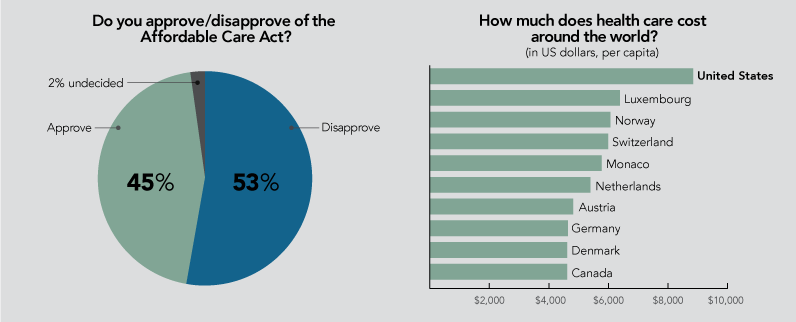
Sources: Pew Research Report (January, 2015) and Kaiser Family Foundation (2012)
The candidates have all vowed to overturn Obamacare, which they argue has led to steep hikes in insurance premiums and costs, and a decrease in quality and choice. Rand Paul and Ben Carson remain the most outspoken critics of government-mandated healthcare, arguing that the law infringes on the personal liberties of patients and medical professionals. Carson has gone as far as calling it the worst thing “since slavery." Although no Republican candidate has released a comprehensive alternative plan, most propose replacing it with a market-driven” system.
Republicans have been largely against expansion of Medicaid health programs for poor families and children, although both Chris Christie and John Kasich expanded Medicaid programs while serving as governors. The candidates, however, are generally less opposed to Medicare, the popular national health program for seniors. Most support continuing the safety net program, although some advocate cutting costs and raising the eligibility age.
Democratic candidates all staunchly defend Obamacare and the concept of universal healthcare. Bernie Sanders also advocates for creating a single-payer, government-funded healthcare system, similar to what exists in Canada and many Western European nations. Clinton and Sanders have both addressed the soaring costs of prescription drugs, proposing to import drugs from Canada and encourage negotiations with private companies in order to drive down prices.

Photo Credit: Flickr/John Walker
With the skyrocketing cost of both private and public universities and the uncertain economic opportunities awaiting recent graduates, student debt has reached historic highs. About 40 million Americans– up from 29 million in 2008 - are currently paying off student loans. On average, borrowers are carrying $29,000 in loans (up from $23,000 in 2008). That amounts to a tripling of student debt in the last decade, to roughly $1.2 trillion nationwide.
Student loans have become an increasingly large burden for families, particularly for younger households. According to recent data from the U.S. Department of Education, nearly seven million Americans in the past year defaulted (failed to make a payment for over a year) on their federal student loans.
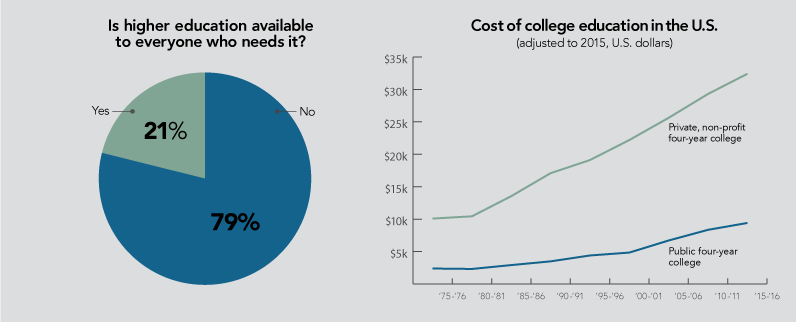
Sources: Gallup Poll (April, 2015) and College Board (2015)
So far, no Republican candidate has released a comprehensive proposal on student debt, but most have suggested a preference for “free market” solutions for reducing college expenses. Marco Rubio and Chris Christie both propose allowing students to partner with investors for a cut of future earnings. Rand Paul, meanwhile, proposes allowing students to deduct the cost of education over the course of their working careers in the form of tax breaks.
Among the Democrats, Bernie Sanders proposes the most progressive policy, proposing to make tuition free at all publicly-funded colleges. Hillary Clinton's $350 Billion “New College Compact” plan focuses more on ending student debt than eliminating tuition, although it does include free community college. Similarly, Martin O'Malley proposes a freeze on tuition rates and an increase in federal Pell Grants and work-study programs.